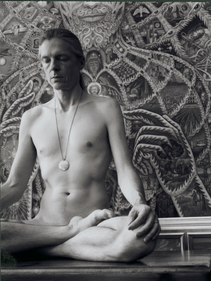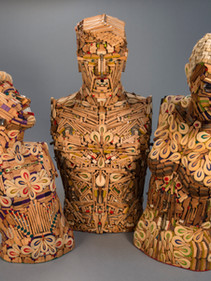
(1864–1930)
Adolf Wölfli
Adolf Wölfli was born February 29, 1864 in Bowil, Switzerland, the youngest of seven children whose father was a stonecutter and mother, a laundress. Physically and sexually abused, he was orphaned before his tenth birthday. He was soon officially made a ward of the community, living in a variety of state-run foster homes. As a young man, Wölfli worked as an itinerant farm laborer and grave digger, developing a powerful build. He briefly joined the military in 1883, as part of the infantry. He never married, being forbidden to court the young woman he loved by her father, due to his low social status.
In 1890, Wölfli was sentenced to two years in prison for the attempted molestation of two young girls, and in 1895, after a third incident of alleged molestation of a three-and-a-half-year-old-girl, he was committed to the Waldau Psychiatric Clinic in Bern, Switzerland where he remained until his death in 1930.
Suffering from psychosis and terrifying hallucinations, Wölfli was violent with other patients and subsequently, he was frequently placed in isolation during his first decade in the Waldau clinic. After four years, Wölfli began to draw and write, compose and collage. His earliest preserved works date from 1904, showing highly restless and symmetrical pencil lines drawn on newsprint. These early works combine his images, words, and musical notations, and forecast the principal motifs and pictorial symbolic devices of Wölfli's later works.
Dr. Walter Morgenthaler arrived at Waldau in 1908, and that same year Wölfli embarked upon the epic autobiographical project that would consume the remaining twenty-two years of his life. The text of this autobiography is interspersed with poetry, musical composition, and three thousand illustrations, comprising more than twenty-five thousand pages of intermingled reality and fiction, and recasting himself as a sainted child. Hand-bound by Wölfli and stacked in his cell, the forty-five volumes he produced eventually reached a height of more than six feet.
"Every Monday morning Wölfli is given a new pencil and two large sheets of unprinted newsprint. The pencil is used up in two days; then he has to make do with the stubs he has saved or with whatever he can beg off someone else. He often writes with pieces only five to seven millimeters long and even with the broken-off points of lead, which he handles deftly, holding them between his fingernails. He carefully collects packing paper and any other paper he can get from the guards and patients in his area; otherwise he would run out of paper before the next Sunday night."
Dr. Morgenthaler also mentioned that at Christmas, the hospital gave Wölfli a box of colored pencils which "lasted him two or three weeks at the most." A few days before his death, Wölfli lamented his inability to complete the final section of the autobiography, a grandiose finale of nearly three thousand songs, which he titled "Funeral March." Wölfli died on November 6, 1930 in Waldau Clinic after 35 years of residing there. His work was greatly championed by artist Jean Dubuffet and he was one of the first artists to be associated with the Art Brut or 'raw outsider artist' label.
To learn more about Adolf Wölfli, visit The Adolf Wolfli Foundation, Museum of Fine Arts, Bern, Switzerland, & http://www.adolfwoelfli.ch/






